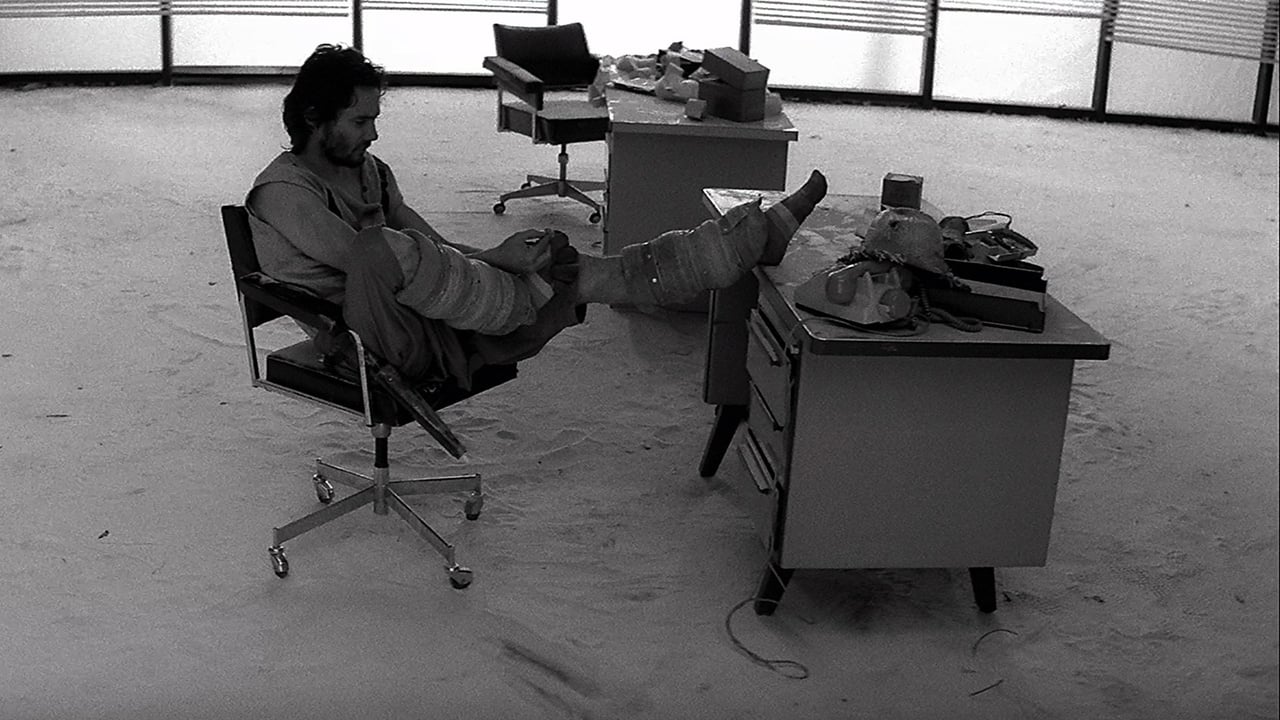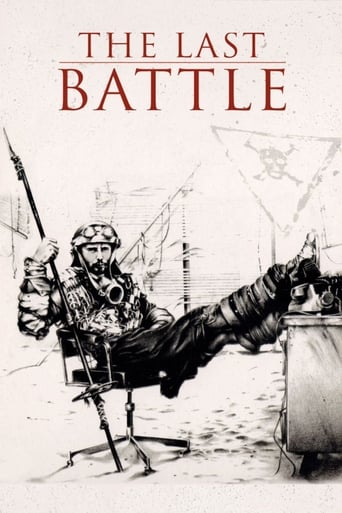

What a waste of my time!!!
... View MorePlot so thin, it passes unnoticed.
... View MoreBrilliant and touching
... View MoreThis is a dark and sometimes deeply uncomfortable drama
... View MoreLe Dernier Combat/The Last Battle (1983) is a film that fits perfectly into the post Blade Runner/post Mad Max subgenre of the post-apocalyptic art drama. Other examples of this style of film-making can be found in Sogo Ishii's Burst City (1982), Lars von Trier's The Element of Crime (1984) and Shinya Tsukamoto's Tetsuo: The Iron Man (1988).As with those particular films, The Last Battle is notable for its visual design and emphasis on style over narrative; with director Luc Besson creating a dark, dank and depressing world of decay and dilapidation. The visual iconography is filled with rich, if somewhat slightly superficial detail; including distressed buildings, burnt out cars and gangs of feral warriors stalking the shadows. This is combined with a plot that attempts to encapsulate the metaphorical struggle of every day existence, with plenty of room left over for Besson to create a lingering sense of atmosphere and some inventive visual set-pieces. The film would be one of the first to introduce the concept of "cinema-du-look"; a brief cinematic resurgence in French cinema that saw a younger generation of filmmakers looking back to the days of the Nouvelle Vague and combining that sense of playful experimentation with elements of early 80's pop culture. Besson would come to define this movement with his second feature, the chic and silly crime thriller Subway (1985), by creating an archetypical cinema-du-look experience to stand alongside Diva (1981) by Jean Jacques Beineix and Mauvais Sang (1986) by Leos Carax.In keeping with the high-style/high-concept approach, The Last Battle is notable for its overall cinematic design. Firstly, the film is almost wordless, with no real dialog interaction, only sounds and a smattering of very 80's synth music care of Besson's regular musical collaborator Eric Serra. Secondly, the film is shot in black and white cinemascope, with much juxtaposition between the expressionistic use of light and shadow with the almost cinema-vérité like use of actual, physical production design and, occasionally, hand-held cinematography. It gives us a slight hint of the direction that Besson would follow with later films, such as his trio of 90's masterworks, La Femme Nikita (1990), Léon/The Professional (1994) and The Fifth Element (1997); but really, this could still be seen something of an anomaly within his vast body of work.The basic plot of the film can be explained in a single line, with the story exploring the devastation of civilization and issues of brutality, hostility and isolation. Here, French pop singer Pierre Jolivet stars as the main character (identified cryptically as "The Man", again, emphasising the anti-plot/anti-narrative approach of the film) who is menaced by "The Brute" (played by Besson regular Jean Reno) on his journey through a world filled with people rendered mute by an unknown incident. It is the titular battle of both cunning and wits between Jolivet and Reno that becomes the backbone of the film, with the two characters testing each other, both mentally and physically, in a series of prolonged visual set-pieces. Alongside these scenes we get some surreal moments and elements of broad humour that owes a small debt to the silent comedy of Chaplin and Keaton and a lot of exploration of the visual geography of the world that Besson creates, quite spectacularly, on an incredibly limited budget. Ultimately the film points towards the futility of conflict in an era when people should be banding together in order to fight the bigger issues, but this is all perhaps secondary to the world that is created and the incredibly visual way in which Besson chooses to interpret it. Obviously having no dialog and only a few minutes worth of dated electronic music, combined with the vague characterisations and emphasis on style over content, The Last Battle certainly won't be a film for everyone. Even if you're already familiar with Besson's trio of 90's classics, or even lesser known cult films such as The Big Blue (1988) and Angel-A (2005), the look and feel of The Last Battle might still be something of a shock to the system.The film at times feels like an action film, but really, when we think about it, there isn't all that much depicted in the way of conventional action. Likewise, the film could be approached as something of an art film, but again, it seems almost too shallow or too playful to appeal to that particular crowd. So who will this film appeal to? I guess the target audience is anyone with an open mind and a real love for all forms of cinema, regardless of genre or convention. Besson fans too might appreciate seeing his first feature film, which really strays from the sun-kissed cool of Subway and The Big Blue, or the ultra-chic violence of Nikita and Leon. It isn't something that I would call a classic, but for me, personally, the film has a lot to recommend; chiefly that great sense of style and the use of black and white, widescreen cinematography; which really makes it stand out. Likewise, the performances from the two leads, Jolivet and Reno, as well as Jean Bouise as an aging doctor who looks after Jolivet's nameless drifter, are all commendable, drawing on subtlety and a strong sense of physicality to compensate for the lack of dialog and plot.The Last Battle may not be a masterpiece and may very well prove to be something that alienates many potential viewers; however, having said that, one really has to admire Besson's scope and vision, especially at this early stage in his career. Thematic similarities noted by other critics to films such as Claude Feraldo's Themroc (1973) as well as the aforementioned Mad Max 2: The Road Warrior (1982) are constant, as is the vague feeling of nostalgia when you consider how much subsequent music videos and TV commercials have borrowed from this particular style. So, a real cult film for anyone with a keen appreciation for underground art-cinema, post-apocalyptic sci-fi or the work of Luc Besson.
... View MoreIf you expect that this movie is full of action and grabbing you from the start then don't watch it. But if you like those kind of meditative movies which stick in your mind for a while, until you get the details, then you will love it. Now don't get me wrong there is action and there are things going on just not in the usual way. Basically the plot is in a post-apocalyptic world where anyone fights in his (or their) way for survival. In this fight they lost the ability to speak... I don't want to write more to not spoil the movie for you, but trust me if you like SF-authors like Lem or Capec or even some from Orson Scott Card you will love this movie.
... View MoreThis is probably the most uninvolving film I've ever seen. I watched it because I have a soft spot for Leon (everything else Besson has done has been just awful, in my opinion, with the exception of the script for Wasabi) and Jean Reno. It's a testament to just how bad this film is that Reno, one of the most charismatic and effortlessly affable actors (admittedly he's just starting out here) can't make this film, or the moments in which he is on screen, watchable.It's all very film-schooly: black and white, no dialogue, people doing things for no apparent reason, people chasing each other while in turn being chased by a shaky camera. And, predictably, none of it is entertaining.It's not a "French Mad Max" as some people have claimed (actually, I think they mean "Mad Max 2") - that is a superficial comparison based only on the fact that both films have a post-apocalyptic setting, and is just the kind of comment you'd expect from someone who doesn't know what they're talking about. Mad Max 2 was pulsating, Mad Max 2 was exciting, Mad Max 2 was worth your time - Le Dernier Combat is none of these.I know it's supposed to be cool to like arty black-and-white French films and equally cool to say you saw something in them that other people did not (or you managed to sit through it without feeling drowsy), which is why I wouldn't trust anyone who claims to like Le Dernier Combat, because I see nothing of worth in it whatsoever; it asks for so much and gives nothing back. I found myself drifting from it after about five minutes and it never did anything to regain my full attention. Anyone who can sit through it undistracted isn't human, or, at the very most, is psychotic. (Actually, they're probably just trying to seem "cool").
... View MoreWell, I guess I was in the mood for a movie that really grabbed me from the beginning. This movie wasn't it. It plodded along at a pretty slow, deliberate pace for the first 40 minutes, but there wasn't really anything in it that I was terribly interested in--there's an intriguing and mysterious feud between Jean Reno's character and an old man, but more of the first 40 minutes is dominated by the wanderings of the main character, whom I didn't know much about and couldn't really relate to at the time. He wanders around alone for the most part, he doesn't meet anyone; I imagine the director was trying to depict the loneliness of the human condition in this post-apocalyptic world or something, which is all good, but I still wish he'd trimmed it down from 40 minutes to 15, because it can get incredibly boring.But after those 40 minutes, things start to get very interesting. I guess I won't really say more than that because I don't want to spoil anything. So if you've seen the first 15-30 minutes of this movie and are thinking about turning it off (like I was), just stick with it--it gets a lot better.One of the most interesting things I found about this movie was the fact that it had no dialogue whatsoever, which really made me have to think about what was happening, how characters were feeling and what their motivations were, why things were how they were in this post-apocalyptic world, all of which gives the story a lot of room for audience interpretation. And it's amazing how much more satisfying a movie is when the actors aren't telling you exactly what's going on.
... View More